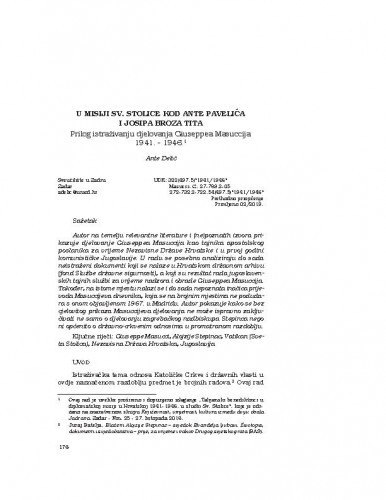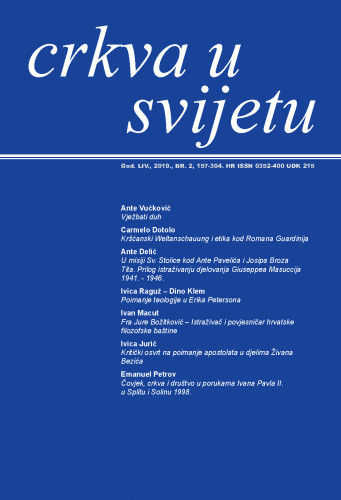Autor na temelju relevantne literature i (ne)poznatih izvora prikazuje djelovanje Giuseppea Masuccija kao tajnika apostolskog poslanika za vrijeme Nezavisne Države Hrvatske i u prvoj godini komunističke Jugoslavije. U radu se posebno analiziraju do sada neistraženi dokumenti koji se nalaze u Hrvatskom državnom arhivu (fond Službe državne sigurnosti), a koji su rezultat rada jugoslavenskih tajnih službi za vrijeme nadzora i obrade Giuseppea Masuccija. Također, na istome mjestu nalazi se i do sada nepoznata inačica prijevoda Masuccijeva dnevnika, koja se na brojnim mjestima ne podudara s onom objavljenom 1967. u Madridu. Autor pokazuje kako se bez cjelovitog prikaza Masuccijeva djelovanja ne može ispravno zaključivati ne samo o djelovanju zagrebačkog nadbiskupa Stepinca nego ni općenito o državno-crkvenim odnosima u promatranom razdoblju.; The Vatican had never recognized the Independent State of Croatia (henceforth ISC) in accordance with its traditional policy of not giving recognition to the countries formed in war until hostilities cease and peace treaties come into effect. However, a few months after the declaration of the ISC, the Holy See sent an apostolic visitor to the Croatian Catholic episcopate in Zagreb, Dr. Ramiro Marcone, a monk from the Benedictine abbey in Montevergine, Italy. Marcone was accompanied by his secretary, Dr. Giuseppe Masucci, also a Benedictine monk. The two men lived in Zagreb until the end of the ISC in 1945 but also stayed for some time after that. In accordance with their duties, Marcone and Masucci were in contact with the archbishop of Zagreb, Alojzije Stepinac, on a daily basis and were thus well-informed about numerous issues of the time, especially those pertaining to the relationship between the Catholic Church and the government of ISC. The Catholic hierarchy headed by archbishop Stepinac, welcomed the proclamation of ISC and throughout the war expressed their belief that the Croatian people had the right to its own independent state. Abbot Marcone and his secretary Masucci acted in synergy with archbishop Stepinac. In accordance with his mission Marcone submitted reports to the Holy See while his secretary Masucci kept notes in his diary. One can observe Masucci's constant work on saving the persecuted, specially Jews from his diary (which has two different versions in Croatian translation). After the end of ISC, Masucci and Marcone were under strict surveillance and control of the secret service of the new communist regime which considered the Catholic Church an enemy of the state and openly persecuted it with the intention of destroying it. Abbot Marcone travelled to Rome on 10 July 1945 and the Yugoslav authorities denied him re-entry.
Sažetak

 Crkva u svijetu : 54,2(2019) / glavni i odgovorni urednik, editor-in-chief Mladen Parlov.
Crkva u svijetu : 54,2(2019) / glavni i odgovorni urednik, editor-in-chief Mladen Parlov.